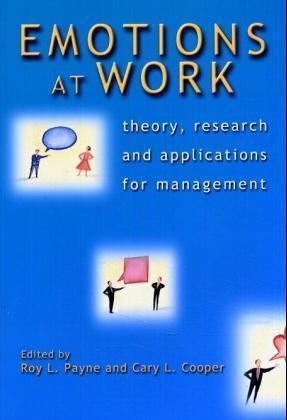Read more
Informationen zum Autor Roy L. Payne graduated in psychology at Liverpool University and has spent most of his career as a researcher and teacher in business schools and psychology departments in the UK. He is currently Professor of Organizational Psychology at Curtin University of Technology, Perth, Western Australia. His work has led to publications in major international journals on organizational structure and climate/culture, and he has also published extensively in the occupational stress area. The latter publications include four books co-edited with Cary L. Cooper which have been widely cited in the occupational stress literature. These remain active areas of interest, as well as more recent work on trust in organizations. Cary L. Cooper is BUPA Professor of Organisational Psychology at the Manchester School of Management, and Pro-Vice Chancellor of the University of Manchester Institute of Science and Technology. He is President of the British Academy of Management, Fellow of the Academy of Management, and recipient of the Academy's 1998 Distinguished Service Award. He has published in an extensive range of journals and books on stress, health and well-being in the workplace and was founding editor of the Journal of Organizational Behaviour. He is a Fellow of the British Psychological Society, Royal Society of Medicine, and the Royal Society of Health. Klappentext Emotions at Work is a comprehensive review of the whole spectrum of emotions, both negative and positive, as they impinge upon organizations and their workforces. Roy Payne and Cary Cooper have enlisted the expertise of an international star cast to convey the importance and magnitude of this topic to the academic and the business world today. Arranged in five sections, this important reference includes definitions, measurement and assessment, biological correlates, the influence of organizations on emotion, how to manage emotions and what future influences there may be on the area, including discussion of emotional intelligence. Whatever the individual topic under discussion, authors relate their findings to the workplace and practical applications for management. Zusammenfassung Emotion has traditionally been studied as an outcome of work! for example in the form of job satisfaction or job strain. In recent years! however! organisational psychologists have begun to recognise that emotions experienced at work! such as anger and shame! can have a direct effect on employees' well-being and performance. Inhaltsverzeichnis About the editors. List of contributors. Preface. Part I: The nature of emotion. Chapter 1: Varieties and functions of human emotion (Robb Stanley and Graham Burrows) Chapter 2: Emotion! mood! and temperament: similarities! differences! and a synthesis (Elizabeth Gray and David Watson) Chapter 3: Discrete emotions in organizational life (Richard Lazarus and Yochi Cohen-Charash) Part II Measuring and assessing emotion at work. Chapter 4: Emotions in the workplace: biological correlates (Maurice King). Chapter 5: Measuring emotions at work (Roy Payne). Part III Organizational influences on emotion. Chapter 6: Affect at work: a historical perspective (Howard Weiss and Art Brief). Chapter 7: Culture as a source! expression! and reinforcer of emotions in organizations (Janice Beyer and David Nino). Chapter 8: Origins and consequences of emotions in organizational teams (Carsten de Dreu! Michael West! Agneta Fischer! and Sarah MacCurtain). Chapter 9: Emotions and organizational control (Stephen Fineman). Part IV: Managing emotions in the workplace. Chapter 10: Helping individuals manage emotional responses (Rose Evison). Chapter 11: Organizational management of stress and destructive emotions at work (Cary Cooper and Sue Cartwright). Chapter 12: Emotion and offices at work (Ian Donald). Part V: Emotions and the future. Chapter 13: Future work and its emotional implic...

